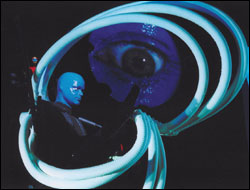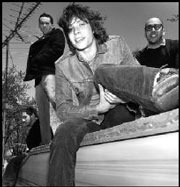JERRY CANTRELL
Memorial Stadium
3:45 p.m. Mon., Sept. 2
Jerry Cantrell is calling from a tour bus traveling somewhere in the mountains outside Scranton, Penn. It’s his third try in the last 15 minutes. It is not going well.
“Reception up here . . . we’re in the middle of the fucking boonies . . . woods right now, coming down a hill . . . Jesus! Let me get around this fucking corner and see if this gets any . . . “
There is the sudden raw complaint of cellular acid reflux, then silence. A long five minutes passes before the phone rings again.
“O.K.,” says Cantrell, noticeably more at ease, “that’s better. Where were we?”
Where were we? Well, three months earlier we were hanging poolside at an off-the-Strip Hollywood hotel doing another interview, ostensibly about Cantrell’s second solo CD, Degradation Trip. It was just weeks before the release of the album, normally cause for joy—but only two weeks since the death of Cantrell’s longtime friend and Alice in Chains bandmate Layne Staley.
Staley’s passing seemed to be a cruel capper for the arduous two-year making of Degradation Trip. Started partly because of Alice’s long inactivity, Cantrell assembled nearly 30 thunderous, soul-scraping songs for his sophomore set. He recruited new musicians and began recording, only to fire his engineer after one day. Two months later, he started again, but things came to a screeching halt with his split from Columbia Records. To keep the project financed, he was forced to sell his much-loved home in Woodinville. Record finally completed, he struck a deal with nu-metal indie Roadrunner Records. He was back on the road when the call about Staley came.
“We had been doing shows all that week,” Cantrell recalls grimly. “We flew back to Seattle for the [funeral] service, then shipped right back out. We’ve been playing nonstop ever since.”
Cantrell began his own never-ending tour sharing the bill with on-the-rise labelmates Nickelback, before opening a series of arena shows for the Lord’s favorite cock-rockers, Creed. It’s an interesting coupling; Creed’s songs dabbling in so-called spiritual enlightenment, while Cantrell’s revel in moral bankruptcy.
“It’s a little bit different playing for the Creed crowd,” Cantrell chuckles, “but our band is rocking hard, and the response has been pretty great, especially considering we only get to do 50 minutes—nine fucking songs—a night. We’re constantly switching up the sets, trying to play as much new material and Alice stuff as we can.”
Cantrell and his touring band (Atlanta grinders Comes With the Fall) will be allowed far more playing time at the Stadium during Bumbershoot, an opportunity Cantrell seems genuinely excited about. “Yeah, I’m looking forward to it. I’m trying to remember if Alice ever played Bumbershoot, but my memory is not too great—there’s been so many fucking shows.”
After the Bumbershoot show, the band will take a couple weeks off, then head to Europe for a headlining tour. Then it’s a return to the states for more roadwork. “It’s good to have a break, cause it can get pretty monotonous,” says Cantrell, who’s managed to keep sane on the road by indulging in a favorite pastime, fishing, as well as playing tour bus DJ.
“I’ve been on a country kick lately. I got Johnny Cash’s box set, and Marty Robbins’, and the O Brother, Where Art Thou? soundtrack has been really big on the bus. We’re trying to learn a couple songs off it, mainly ‘Man of Constant Sorrow’; it’s such a great fucking song. I love Ralph Stanley.”
“When you’re playing rock every night, you don’t want to hear it after a while. And to be honest, most of the stuff you hear these days is pretty unsatisfying,” he says. “Radio stations are pretty fucked up, as well as the bands themselves. You hear a couple of cool stations that still have a little sense of adventure, but that deal is pretty much sewn up by a couple of corporations. They program it, they buy the venues—it’s ridiculous.”
When asked if he’s approaching the road, or rock life in general, more cautiously since Staley’s passing, there’s a long silence. For a moment it feels like the phone’s gone dead again.
“Touring is touring man,” he finally answers, “it never really changes; it’s an endurance test. It’s not enough to just make a great record—you’ve got to get out, and you’ve got to work it hard, you bust your ass, you do what you have to do.
“It’s all part of the deal.”









